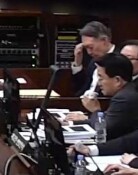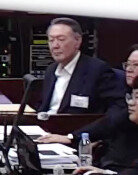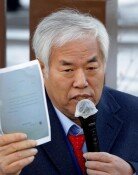[Editorial] Root Out Governments Wiretapping Activity
[Editorial] Root Out Governments Wiretapping Activity
Posted August. 06, 2005 06:18,
The National Intelligence Service (NIS) confessed to engaging in an organized illegal wiretapping plan during Kim Dae-jungs administration as well. The agency also owned up to cell phone wiretapping, an act it has constantly denied whenever suspicions burgeoned, asserting that such a thing is technically impossible. Kims administration loudly proclaimed that it was the greatest victim of torture and illegal tapping during the period of authoritarian rule and promised to be reborn by reforming the NIS. One is appalled at the administrations duality. It thoroughly deceived the public, putting democratization in the vanguard. It has laid bare the true colors of curse-and-learn political power. The public remained suspicious and uneasy but helpless. Now, they are enraged.
It was revealed that under the Kim administration, the NIS developed their own wiretapping device fit for mobile cell phones. Agents carried the device on vehicles, approached the target, and got to work. Authorities from the Kim administration remained adamant that Kims Government of the People places top priority on the protection of privacy for our people, and attacked those who raised questions on government wiretapping, accusing them of being politically motivated and backbiting. Such an attitude is nothing less than abominable.
The Kim administrations detestable denials culminated in a compensation claim worth hundreds of millions of won against Dong-A Ilbo, when it ran an article in 2002 on the NISs illegal wiretapping of cell phones. The administration called the article nonsense. When the court took the side of Dong-A Ilbo in the first trial, the administration refused to accept the ruling and appealed. Talk about being brazen-faced.
The NIS deserves some credit for going public with the illegal wiretapping activities they have engaged in under former administrations after the recent revelation on their wiretapping activities during Kim Young-sams administration. However, there is much to be done to completely dispel and placate public anger and suspicion.
First, what happened to the illicitly wiretapped contents? The authorities say they were all destroyed, but that sounds unconvincing. Given that recorded tapes and dictated documents from 1997 are still around, there is no guarantee that contents from later times have been destroyed. Purporting to make strategic use of the contents would be no less than attempting an additional crime on top of the wiretapping. Nor should we tolerate attempts to publish only the contents that suit certain tastes under the pretext of serving public opinion. In this sense, the Prosecutors Office has made the right decision in taking a different stance from Cheong Wa Dae, refusing to investigate illegally wiretapped contents of the tapes, because that is a step toward safeguarding the constitution and protecting basic rights.
The NIS says that illegal wiretapping by the government was terminated since March 2002, but the public remains unconvinced. There has been a recent surge in legal wiretapping with warrants from the court. The public has been deceived by the government too many times to believe that no illegal wiretapping, disguised as being legitimate, is conducted. There is also suspicion of information agencies that were formerly in charge of wiretapping.
Now, the ball is in the court of the Prosecutors Office to completely dispel the publics suspicions on illegal wiretapping. The Prosecutors Office should thoroughly investigate whether illegal wiretapping has indeed been put to an end as the NIS claims, find clear evidence, and disclose it to the public. Needless to say, wiretapping-related crimes of the past should be revealed to the core and those involved put to justice. That is the way to uphold the constitution which stipulates the protection of telecommunications confidentiality and the path toward being reborn as the Prosecutors Office of the people. Uri Party leader Moon Hee-sang and Rep. Lee Kang-lae, who were former officials of the NIS under the Kim Dae-jung administration, must be investigated as well.
Truth finding and punishment are the jobs of the Prosecutors Office, while system improvement is the job of the National Assembly. Lawmakers should establish measures to eradicate illegal wiretapping once and for all. The public will not tolerate lawmakers who are only immersed in strategically using the wiretapping and its contents, putting the task of eradicating illicit wiretapping on the backburner. There is an unavoidable concern that the Roh Moo-hyun administration is poised to take the illegal wiretapping scandal as an opportunity to reshape the political landscape.
Lawmakers should firmly establish the authority of the National Assembly by first lodging complaints against former NIS heads and Ministers of Information and Telecommunications who, whenever suspicion burgeoned, denied there being acts of tapping, on charges of perjury. In addition, they should also come up with strict systematic safeguards against the possible abuse of power by the NIS that will be reflected in NIS law.
President Roh needs to cast aside the temptation to think there is nothing to lose and politically use the toxic fruit borne from illegal acts. It is the core responsibility of the president to free the public from the fear of illegal tapping.







